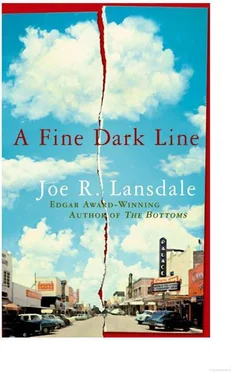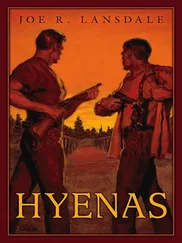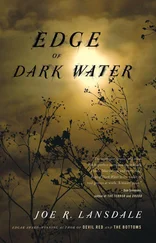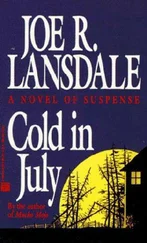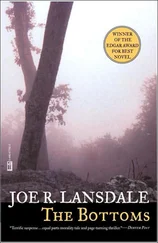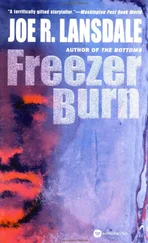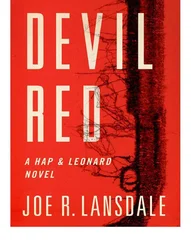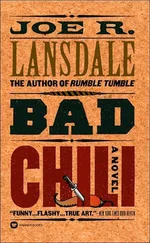At thirteen years old, I was the youngest of the Mitchel clan, and not a sophisticated thirteen at that. I was as unaware of the ways of the world as a pig is of cutlery and table manners. I thought sex came after the number five and before the number seven.
Sad to say, I had only recently gotten over believing in Santa Claus and was mad about it. I had been told the truth by kids at school six months before we moved to Dewmont, and had fought a hell of a fight with Ricky Vanderdeer over the matter. I came home with a battered cheek, a black eye, a limp, and a general ass whipping.
My mother, upset over the beating, and a little embarrassed that a child my age still believed in Santa Claus, sat me down and gave me a speech about how Santa may not be real but lived in the hearts of those who believed in him. I was stunned. You could have knocked me over with a wet dog hair. I didn’t want a Santa in my heart. I wanted a fat, bearded man in a red suit that brought presents at Christmas and could squeeze through a chimney or a keyhole, which was how Mother told me Santa came into our home, not some nothing living in my heart.
This realization led me to the immediate conclusion that if there was no fat, jolly old elf in a red suit that came by magical sleigh, then there was no Easter Bunny hopping about with colored eggs either, not to mention the Tooth Fairy, one of the few mythical creatures I had honest suspicions about, having found one of the teeth she was supposed to have claimed for a quarter lying under my bed, probably where my mother, the real Tooth Fairy, had dropped it.
I had been set wise and I didn’t like it. I felt like a big donkey’s ass.
My ignorance did not end with Santa and assorted mythological creatures. I was no whiz at school either. Though I was smarter and better read than most kids, I was so bad at mathematics, it was a firing squad offense.
Having come from No Enterprise, a three-street town with two stores, two alleyways, a filling station, a six-table cafe, and a town drunk we knew by name, and who in a strange way was respected for his dedication to his profession, Dewmont seemed like a metropolis.
Yet, in time Dewmont actually began to feel sleepy. At least on the surface. Especially during the long hot summers.
The turmoil of the 1960s was yet to come, and Dewmont was way behind anyway. People dressed and conducted themselves like it was the 1930s, or at the latest, the 1940s. On Sunday men wore thin black ties and heavy black suits and hot wool hats. They always removed their hats when they were inside and they still tipped them at ladies.
Because air-conditioning was rare, even in stores, it was sticky-hot then, indoors and out, as if you had been coated in a thin film of warm molasses. In the summer, those men’s suits rested heavy on their victims, like outfits designed for torture. The thin ties lay dead on sweat-stained shirts and the cotton in the shoulders of the suits shifted easily, making lumps; the material held sweat like a sponge holds water; the brims on the wool hats sagged.
In the late afternoons people stripped down to shirtsleeves or even undershirts and sat outside on porches or in metal lawn chairs and talked well after the fireflies came out. Inside, they sat in front of fans.
It didn’t get dark during the summer till way late, and the sun, not blocked by tall buildings or housing developments, dipped into the East Texas trees like a fireball. As it died, it looked as if it were setting the woods on fire.
Certain kinds of language now spoken as a matter of course were rarely heard then in polite company. Even the words damn and hell, if women were present, could stun a conversation as surely as a slaughterhouse hammer could stun a cow.
The Depression was long gone, if not forgotten by those who had gone through it. World War II was over and we had saved the world from the bad guys, but the boom times that had hit the rest of the country had not quite made it to East Texas. Or if they had, they hadn’t stayed long. Came in with the oil field wildcatter for a financial quickie, then played out so fast it was hard to remember there had ever been good times.
There was rockabilly, or rock and roll as it became known, on the radio, but there was no abundance of rock and roll feel in the air where we lived. Just a clutch of kids who hung out at the Dairy Queen afternoons and evenings, especially thick on Friday and Saturday nights.
A few of the guys, like Chester White, had ducktails and hotrods. Most guys had pretty short hair with a pompadour rise in front and plenty of hair oil on it. Wore sharp-creased slacks, starched white shirts, and polished brown shoes, drove their daddy’s car when they could get it.
The girls wore poodle skirts and ponytails, but the most radical thing they did was play the same tune over and over on the jukebox, mostly Elvis, and some of the Baptist kids danced in spite of the lurking threat of hell and damnation.
The colored knew their place. Women knew their place. Gay was still a word for “happy.” Children were still thought by many best seen and not heard. Stores closed on Sunday. Our bomb was bigger than their bomb and the United States Army couldn’t be beat by anyone. Including Martians. The President of the United States was a jolly, grandfatherly, fat, bald man who liked to play golf and was a war hero.
Being blissfully ignorant, I thought all was right with the world.
2
THERE WAS ONE KID I met after moving to Dewmont who I made friends with. His name was Richard Chapman. He was a little older than me, but in the same grade, because he had failed a year.
Like Huckleberry Finn, Richard wasn’t the sort that would make a great adult, but he was one hell of a kid. He could ride a bike faster than the wind, could toss a pocketknife between his toes and not stick himself, knew the woods, could climb a tree like a gibbon, and juggle four rubber balls at a time.
He had a shock of brown greasy hair, made greasier by generous doses of Vitalis, sweat, and body oil. Richard combed his mop straight back like Johnny Weissmuller, who he resembled.
Richard’s hair was constantly slipping out of place, and he spent a good portion of his time flipping it back into position with brutal jerks of his head, and knowing lice lived there, this activity made you nervous. Still, at the time, having a cowlick and a white spot at the front of my hair, I envied that greasy mop of his, along with his muscles.
My thought was, if Richard were in a plane that crashed in the jungle, he would survive and become someone like Tarzan. He would figure out how to hunt, build a hut, and fight natives.
I, on the other hand, would be eaten by lions, or beaten to death by monkeys within moments.
One Saturday morning Richard came over to watch television, to see all the shows on Jungle Theater. While he watched, he held and mooned over my Roy Rogers cowboy boots. He had a thing for those boots; they were red leather and written on the pull-up straps in silver letters was “Roy Rogers.”
Richard’s family didn’t have a TV. They had owned one, but when a storm knocked down their antenna and twisted it up like a pretzel, his father decided it was a sign from God, and sold the set to a sinner.
Even before the jungle shows finished, Richard held one of my cowboy boots against his foot to see if it would fit, and informed me he had to go, had to get back home and do chores and take a beating because he was running late and had left home without asking.
“Why didn’t you ask?”
“Because Daddy would have said no.”
“Then why did you come?”
“I wanted to.”
“What about the beating?”
Richard shrugged.
Being accustomed to beatings, Richard wasn’t overly frightened by the notion. He told me if he thought of himself as Tarzan being tortured by natives, he could make out tough enough to take it.
Читать дальше
